The Evolution of Indian Chess: Anand, Aruna and Arjun at the Indian Express Sports Adda
In 1988, India got its first Grandmaster, Viswanathan Anand. In 2024, India's count of grandmasters has jumped from 1 to 85. This shows the rapid growth of chess in the country. Anand's journey, especially after becoming the World Champion in 2000 inspired the younger generation. Three of the top ten chess players in the world are now Indians: Arjun, Gukesh, and Pragnanandha. This surge promises that Indian chess has a bright future on the international level. In a recent interview with The Indian Express, the person who transformed Indian chess, Viswanathan Anand, the person who supported this man's journey, Aruna Anand, and the person who will become the next big thing in Indian and world chess - Arjun Erigaisi discussed their thoughts on the evolution and future of chess in India, the impact of technology, the surge in young talent, and the challenges and opportunities that lie ahead for the next generation of chess players. Photo Credit: The Indian Express
The Indian Express Sports Adda with the chess stars of India
The Indian Express Adda is a platform that connects with prominent personalities from different fields like Nitin Gadkari (Politician), Nalini Singh (Journalist), Suvir Saran (Michelin Star Chef), and many more. The goal of this program is to have insightful conversations with the guests. The host dives deep into various aspects of guests' lives. Recently, The Indian Express Adda was hosted in Chennai with Viswanathan Anand as the guest of honor, alongside his wife Aruna, and India's top chess player Arjun Erigaisi. The program was hosted by Anant Goenka, Executive Director of The Indian Express Group, and Amit Kamath, Assistant Editor at The Indian Express.


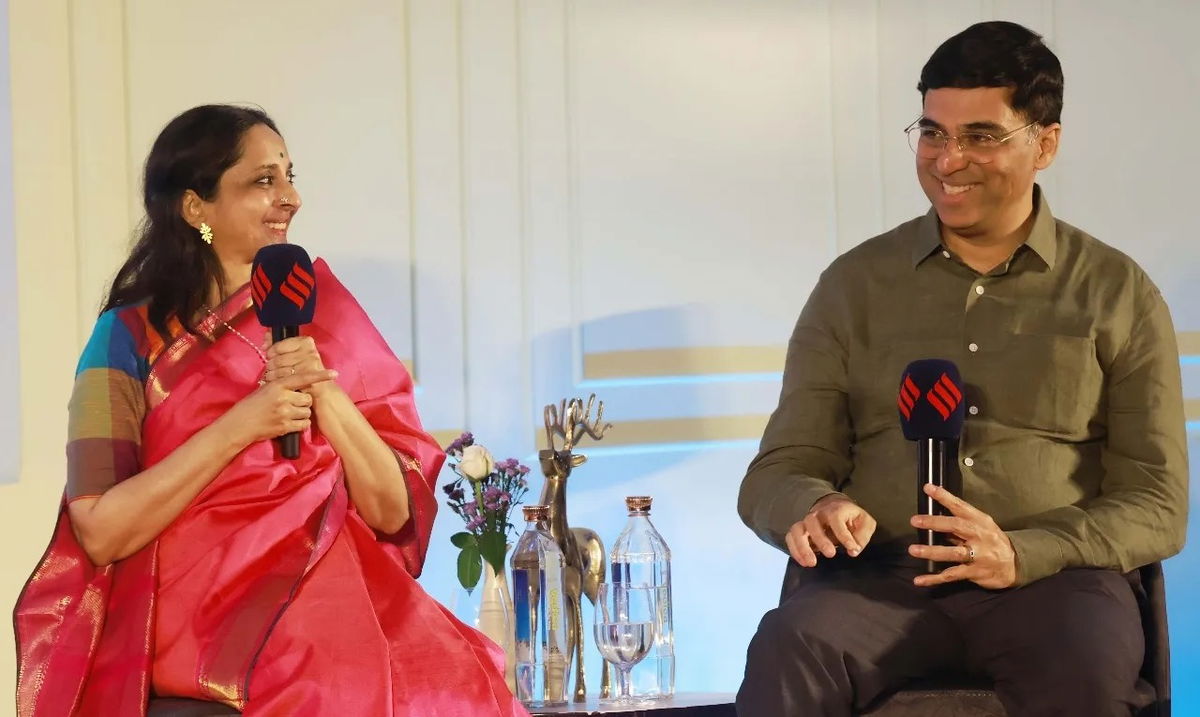





In conversation with Vishy Anand, Aruna Anand, and Arjun Erigaisi
Anant Goenka: You have not only achieved great personal success but also shifted global perceptions of Indian sportspeople. You created an entire culture and ecosystem from India, which is now challenging all over the world. Nowadays, the common approach towards success is to be aggressive and hyper-competitive. But your approach of being successful yet notably kind is very rare in today’s world. Was this approach intentional?
Viswanathan Anand: I think a lot has to do with upbringing and grounding. My family and especially my schoolmates treated me in a certain way. It would feel strange if anything changed in that regard. Even when I had to say something brash, I would agonize afterward, wondering if it was too much or too little. It just felt uncomfortable. Most of the time, I felt that being yourself is easiest for you. When your public persona is what you are comfortable with inside, it's best to stay in that range. I credit my family and friends for their support. Their consistent treatment helped me stay genuine, despite external pressures.
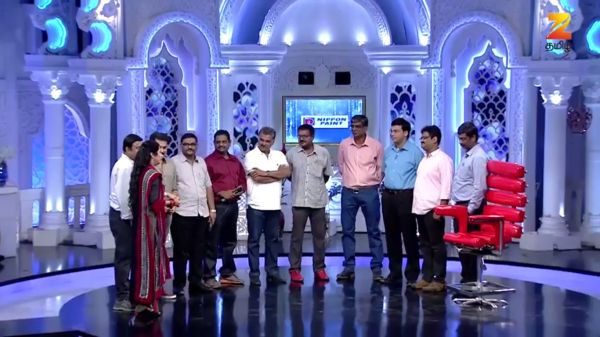

Amit Kamath: Do you see your influence reflected in the new generation of Indian grandmasters, like Gukesh, Praggnanandhaa, and Arjun?
VA: I hope they have seen me growing up and maybe that played a part. They are very well brought up, maybe it's a Chennai thing. Recently, at an event, I stood up to speak, and Praggnanandhaa and Gukesh stood up next to me. They are both top 10 players but felt the need to stand because sitting while I was standing didn't feel right. They are well-mannered kids, but not on the chessboard. They are very polite off the board but very competitive on it. I appreciate that they separate their aggression on the board from their behavior off it.
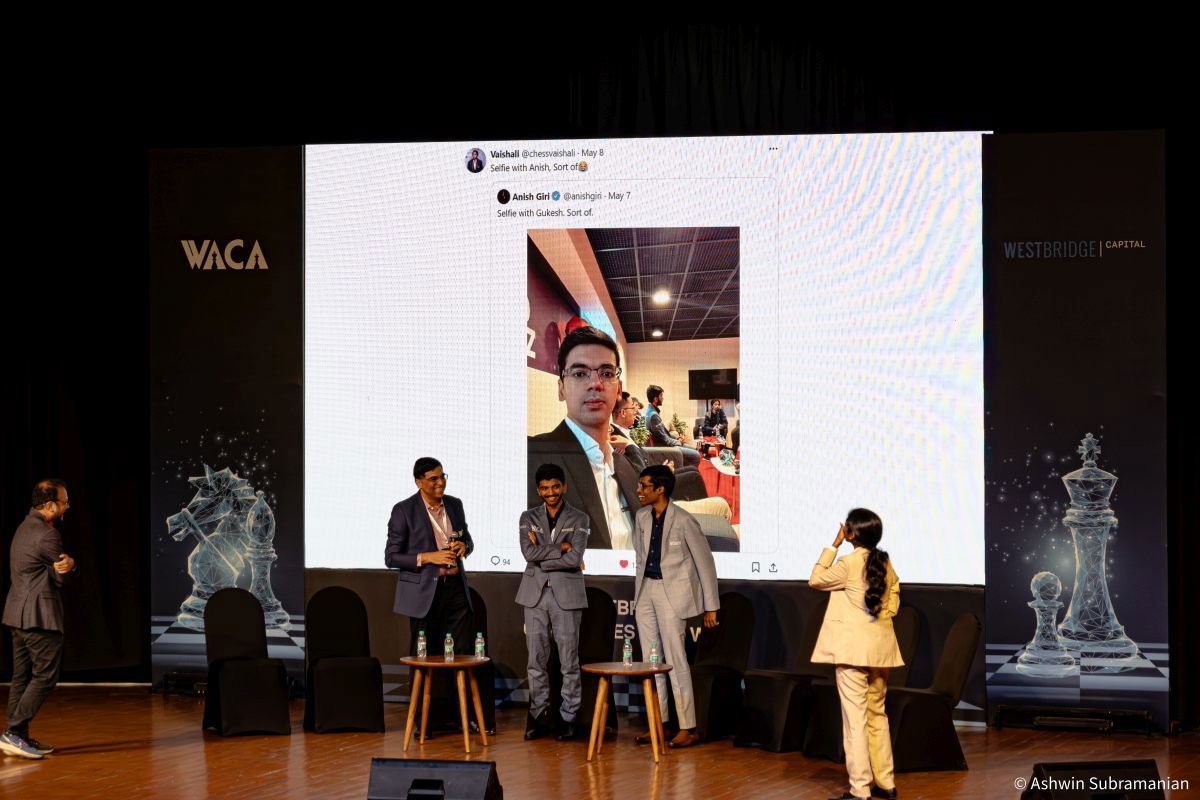
AG: What do you think contributed to this surge of the golden generation of chess players in India? Chess has suddenly taken the country by storm. You have captained this mission of bringing chess to the forefront. What according to you garnered such widespread popularity in a short period?
VA: Recently, a boom was set off by two factors: the pandemic, people had their phones to play chess online, and the Netflix series called ‘The Queen's Gambit.’ The show had an audience of 70-80 million globally and it sparked renewed interest in chess. Many who had been wanting to return to chess finally did. If the pandemic had happened ten years ago, our bandwidth wouldn't have supported this surge. That timing was perfect for chess. The other factor is that in India, we experiment with many sports and impose our own business models on them. Last year, we had the Global Chess League by Tech Mahindra, trying a new Indian way of organizing sports. After all, the aim is to make chess reach larger audiences.
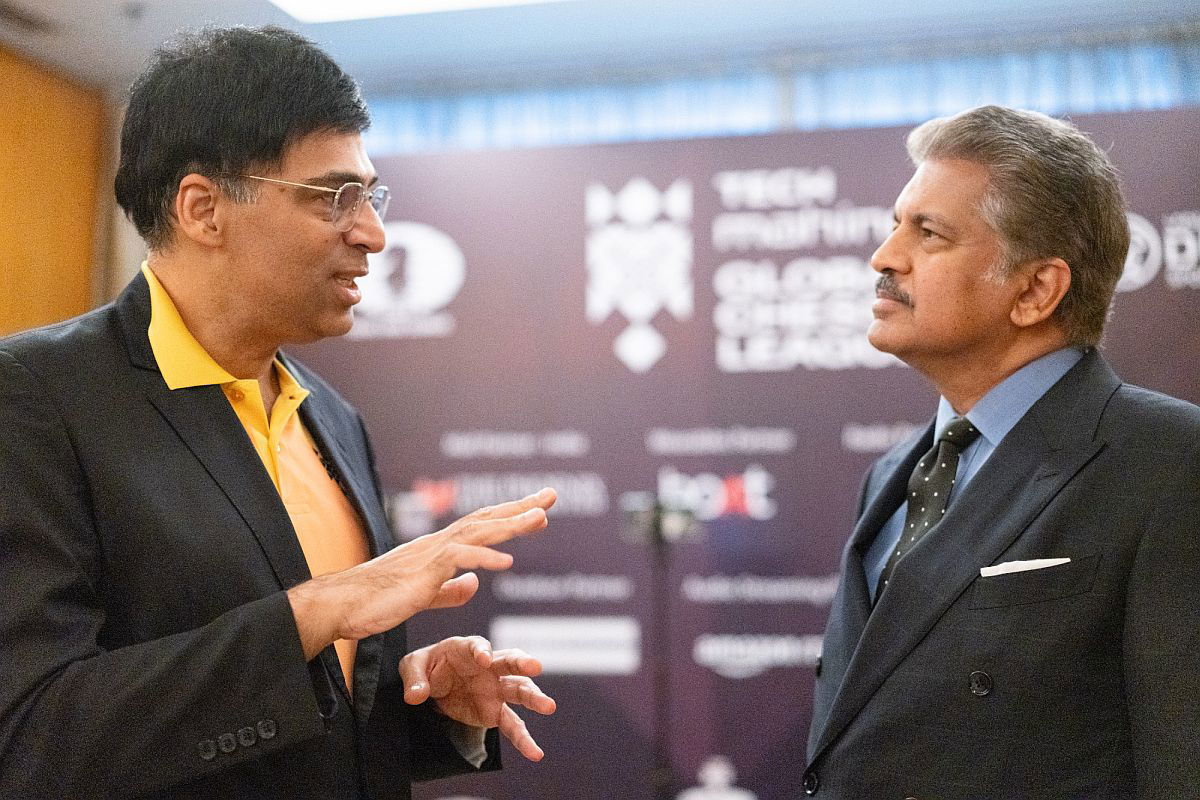
Vishy Anand with Anand Mahindra at the Global Chess League 2023 | Photo: Maria Emelianova
AK: How do you keep your passion for chess so fresh after all these years?
VA: It comes and goes, but if you love the game, you stay motivated. Bad results can kill passion, but I stay updated with modern trends and keep working because I love chess. You have to be all in or not at all! I have learned to be calm. Motivation can wax and wane, but it always comes back strongly. You just ride out the waves.
AG: Chess players seem to be aloof and intimidating. Do you think that chess can be a lonely pursuit, especially for young professionals?
VA: Chess can be insular and self-absorbing, considering its own language and ranking of chess players, which can put chess players in a bubble very fast. While some manage to balance chess with other interests, others struggle with this. For instance, Bobby Fischer faced isolation due to his intense focus on chess and lack of support in his home country. So, to have a balanced perspective, speaking to people who don't understand what you do is very important.
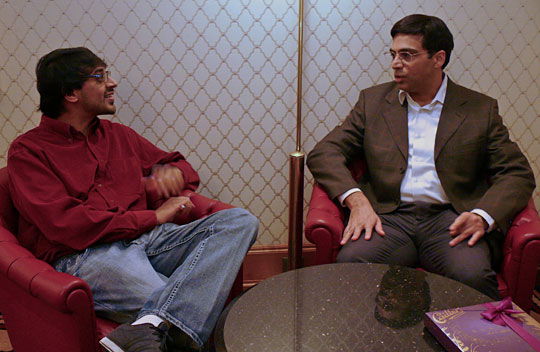
AG: Due to social media and distractions, do you think it is tougher for a young chess player to find the focus and attention needed to conquer chess?
VA: Distractions will always exist; it's about imposing limits and knowing when enough is enough. The positive thing is that social media offers a lot of exposure and opportunities. The more mainstream the sport is, the more it gets easier to fit into society. I think the current generation has fewer challenges fitting in, which is healthy. But, anything excess is bad, and they have to find a way to moderate it.
AG: Sports fans can be fickle, they love you when you win and hate you when you lose. Is this something young chess players now have to deal with given their rising attention?
VA: It's complicated. Sports increase engagement, and once fans are engaged, you can't control it. However, Indians are very supportive of sports overall, and because of this many athletes gain a lot of following. The trend of playing for an audience, not just oneself, has improved. Indians now have more exposure to various sports, but at the same time, their attention spans are dropping, which is why many sports are turning towards faster formats. Overall, it's much easier to be a sportsperson in India today compared to 20 years ago, with better support for equipment, training, and audiences. Sometimes, there will be pressure, fans can be harsh. In my case, I decided that I would never read any chess website during tournaments to avoid negative comments. I can’t demand fans to behave in a certain way, but I can decide what I expose myself to during tournaments.
AG: Aruna, how much has the business perspective changed for you as a manager? How difficult was it 20 years ago compared to now when negotiating contracts for endorsements?
Aruna Anand: It's much easier now because we are more connected, but that also means people expect you to be available all the time. Earlier, there was a clear distinction between workdays and weekends, but now people message at 10 p.m. claiming it's urgent. Business has become easier and more accepting of women in management roles. In 2010-2011, I was often the only woman in a room full of men. Now, it's just regular business, and gender is no longer a question.
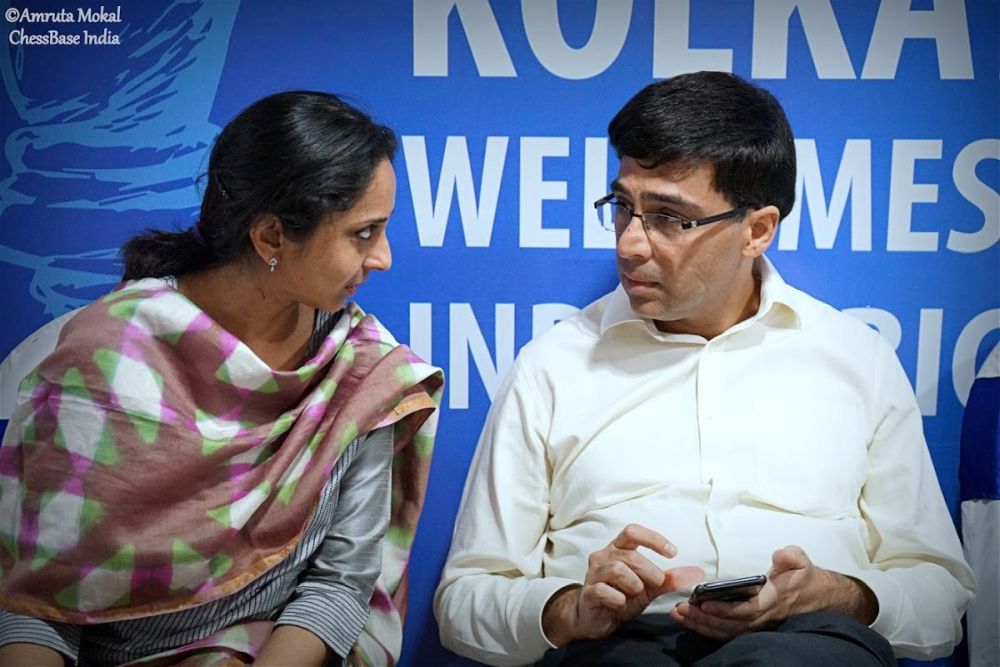
AK: Arjun, how competitive is the current chess scene with players like you, Praggnanandhaa, Gukesh, and Vidit? Do you push each other or benefit from each other's successes?
Arjun Erigaisi: I would say we have a healthy rivalry. It motivates us to work harder and improve, without jealousy. It's best for everyone if it remains the same.

AG: In a highly competitive space, it is rare to be a humble person. Do you and others stand out, or is everyone like that now?
AE: Most of the people I encounter are very humble. As Vishy Sir mentioned, this humility may come from their upbringing. It seems to be the case for most individuals, which is wonderful.
AK: Arjun, how has the reception in the chess world changed from when you were emerging in 2020 to now when playing top players like Magnus Carlsen or Hikaru Nakamura? Magnus Carlsen has even called you a "madman" on the chessboard…
AE: Back in 2020, we had few opportunities to play against top players due to our lower ratings. If we had faced them then, they might have taken more risks, which could have been objectively wrong. Now, they are more cautious because they are aware of our capability to capitalize on mistakes. This reflects a growing respect for our game.
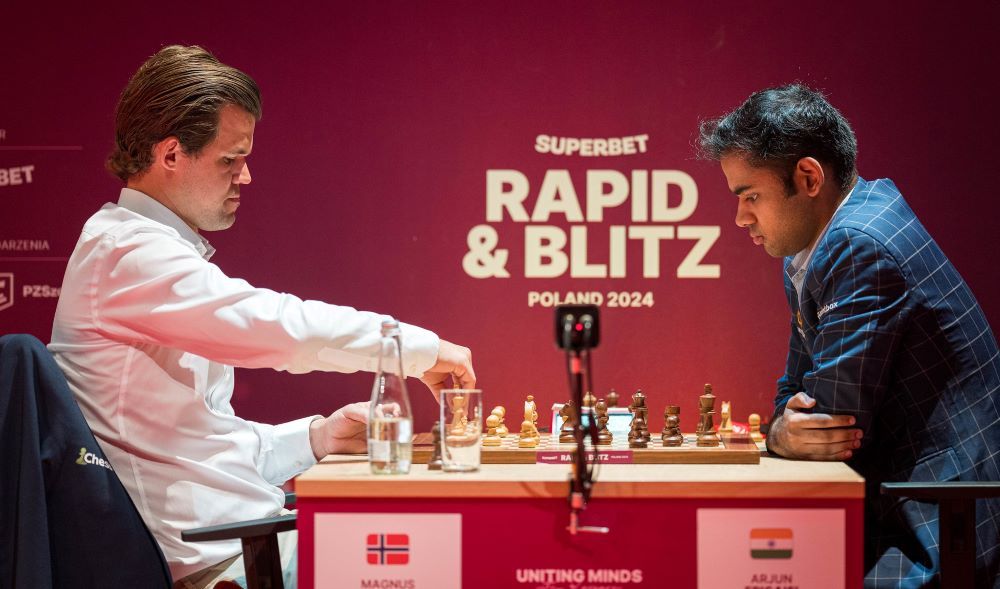
AG: Is there anything specific that the government or associations could do to encourage more people to step up in chess, or are we already doing everything possible?
AE: Government support is very motivating! The Tamil Nadu government has been particularly supportive, as seen with the Chennai Grandmasters tournament last year. It was organized to help Gukesh and me qualify for the Candidates. Their quick response and support was commendable!

AK: What about the financial aspects of being a grandmaster? What are the costs involved, including trainer fees, seconds' fees, and travel expenses? How do sponsors contribute to covering these costs?
AE: It does look like it’s just a chessboard - what can be so expensive about it? But what people don’t realize is it’s a very expensive sport. Almost 50% of my sponsorship goes to my training. Then you have to constantly travel. So, sponsorship is very important to afford high-level training and cover these costs.
AK: Did you feel that you had to give up a bit of your childhood like attending school regularly or socializing with friends to pursue the dream of becoming a world champion?
AE: Back then I didn’t feel any of this because I was deeply in love with chess. Of course, I still love the game, but now that I look back, I sometimes feel regret for not attending school and college like others. It bothers me slightly, but the thought passes quickly.

AG: Vishy, your whole story is like a proper underdog movie script. You faced many challenges and came out of nowhere. Do you think the advantages of the new generation, might become a liability for the next generation?
VA: There were aspects that I found unfair, but there were also things that made us stronger. We learned from those experiences and adjusted our approach. For instance, during my second wave from 2007 to 2013, when I won four titles, we applied the lessons we had learned earlier. Our attitude towards negotiating and understanding the nuances of what to request and what to avoid improved significantly. We had to figure out these details ourselves, as there was no institutional knowledge transfer. Achieving the highest title is already difficult enough, and if things have improved for the next generation, then that's wonderful.
AG: Since artificial intelligence is a popular buzzword these days, you seemed to have stayed away from it. For instance, you didn't compete against the IBM supercomputer when it was a prominent gimmick. Have you consciously avoided such engagements?
VA: I was heavily involved in playing computers when it was still possible to beat them. The results against the supercomputers were not as decisive as they were made to seem; Garry won the previous year, and the computer won the next. The computer was not intelligent in the way we understand AI today. While AI has brought new understanding to the game, I do feel some nostalgia for the days when humans had to figure things out on their own. But overall, I have mixed feelings.

AG: Do you encourage the people you are mentoring to embrace all the technology that comes into training?
VA: Yes, very much! They all have a healthy attitude towards playing non-computer chess as well. They have found the right balance. While my advice from five years ago may be outdated, the fact that they are doing so well indicates that they have found effective ways to use technology.
Full Interview:
Watch the full video interview: Watch the full video of the interview here. Below are the timestamps for key moments in the video:
Timestamps for the above video:
00:00 Intro
01:10 Viswanathan Anand On Being Grounded
06:30 How Sports Get Popular
12:00 How does he keep his passion for chess Fresh
14:50 How does he manage his game and marriage
16:00 Can chess be a lonely sport
22:45 Chess Player and Sharp Memory
25:15 Aruna Anand on her Marriage
32:15 Arjun Erigaisi Welcome
33:45 Arjun On Competitiveness
37:15 Arjun On Govt Support for Chess
38:15 Finances that go on Grandmaster
40:55 Chess before vs Now
43:45 Rapid Fire With Viswanathan Anand
48:00 Rapid Fire with Aruna Anand
51:00 AI & Chess
54:35 Rapid Fire With Arjun Erigaisi
57:55 Q/A round with audience

































